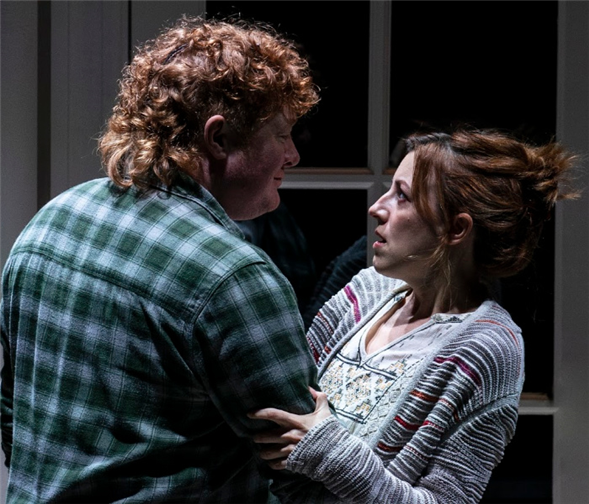Translate Page

Madeleine George's Hurricane Diane inspires soul searching in between laughs
---
To riff on Al Gore, Hurricane Diane is an inconvenient comedy. Madeleine George's show, currently running at New York Theatre Workshop in a co-production with WP Theater, confronts climate change via the funny bone. But how do you make a satire that investigates such a dire threat without being flip or, worse, preachy?
"Comedy is a very powerful genre and it doesn't get the respect it deserves," insists George, whose play The (curious case of the) Watson Intelligence was a finalist for the 2014 Pulitzer Prize for Drama. "We can look at a lot of different aspects of life through comedy; there's a tenderness that allows us to explore the human condition through our foibles."
During Hurricane Diane, audiences cackle at the quirks and shortcomings of four suburban New Jersey housewives while the danger of a coming storm looms large. The only one who might be able to get these self-involved Garden State gals to see the threat beyond their manicured lawns is Diane, their handsome permaculture gardener, who's actually the Greek god Dionysus in disguise. With its stark contrast between theme and tone, the play "is like a chocolate bar with a tragedy wrapper," George says.
Hurricane Diane had its world premiere in 2017 at NJ's Two River Theater, when the Jersey Shore was still recovering from Hurricane Sandy. "I had done a play at Two River that was set in New England, and I could feel that whenever someone from that region saw the show they had a sparkier relationship to it," George says. "So I thought, what story can I set here so the audience can feel directly addressed?"
Of course she wanted to engage local audiences, not alienate them, so carefully calibrating the comedy was key. "The stagecraft was about destroying the set, and the people who were in the process of rebuilding their homes were hit very hard by that image of destruction," she recalls. "We wanted to respect the intensity of those feelings; we didn't want to just poke fun at climate change, we wanted to make art about it."
Inserting Dionysus, who rules theatre, winemaking and fertility, was a clever way to connect this modern-day fable to an ancient foundational story, as Diane hilariously seduces these neighbors into joining her modern-day Bacchae of female environmentalists.
"I'm always interested in putting lesbians in plays," George says. "There's no reason why the universal human experience shouldn't be embodied by a butch lesbian. Dionysus is supposed to be androgynous: He appears as an old bearded man and a young effeminate boy and everything in between. And Becca Blackwell [who plays Diane and uses the pronoun they] is a chameleonlike performer but, at the same time so much themself. Becca has a mischievous, sexy, super-funny persona that has very much informed this version of Dionysus."
As both gardener and god, Diane is uniquely poised to offer suburbanites something they're sure they want -- an on-trend yard -- while also proposing a path to salvation and harmony with the natural world. All of the play's women treat Diane differently depending on how reticent or eager they are to change.
"What denials does climate change demand of people, like me, who use electricity and live in the industrialized West?" George wonders. "The play is exploring those dimensions instead of telling people to change their light bulbs. We're threading a needle to help people come into contact with the full spectrum of our emotions" around this issue.
And that's why Hurricane Diane hits so hard. The laughter may eventually die down, but the questions it raises about our shared responsibility for our plight and whether we can even do anything about it linger. At the center of this storm are people who look and act just like us. "You have to have an eye-level view of humans in order for jokes to land," George says. "The windswept crag? That's for King Lear."
To read about a student's experience at Hurricane Diane, check out this post on TDF's sister site SEEN.
---
Follow Billy McEntee at @wjmcentee. Follow TDF at @TDFNYC.
Top image: Becca Blackwell and Kate Wetherhead in Hurricane Diane. Photo by Joan Marcus.
TDF MEMBERS: Go here to browse our latest discounts for dance, theatre and concerts.